40 Life Choices You’ll Regret by 40

In your 20s and 30s, it’s easy to feel invincible. All the choices you make, no matter how ill-advised or potentially dangerous, never seemed to have any long-term consequences. Drink way too much booze last night? Just sleep it off and you’ll be back on your feet in no time. Haven’t been inside a gym since high school? Who care—you’ve always had a fast metabolism, and you’ve been able to stay fit without exercise for this long. Haven’t been to a doctor in years? Unless you have any alarming symptoms, you’re probably fine. You can tell young people all you want that their bad decisions will catch up with them someday, but most of them won’t believe you. Or if they do believe you, it’s low on their list of priorities.
Well, it’s time to change that. If you’re young and pretty sure there’s nothing you’re doing today that you’ll regret 20 years down the line, you might be in for a surprise. Here are 40 life choices you’ll wish you had a chance to do over by the time you reach 40.
1
Being too sedentary

Too much sitting in your 20s and 30s could catch up with you in middle age. In a 2017 study published in Annals of Internal Medicine, adults aged 45 and older were found to have increased health issues and even advanced mortality rates because of too many years vegging on the couch rather than getting outside and working up a sweat. You may feel fine today, but your 40-year-old body will thank you for leaving the house.
2
Eating too much junk food
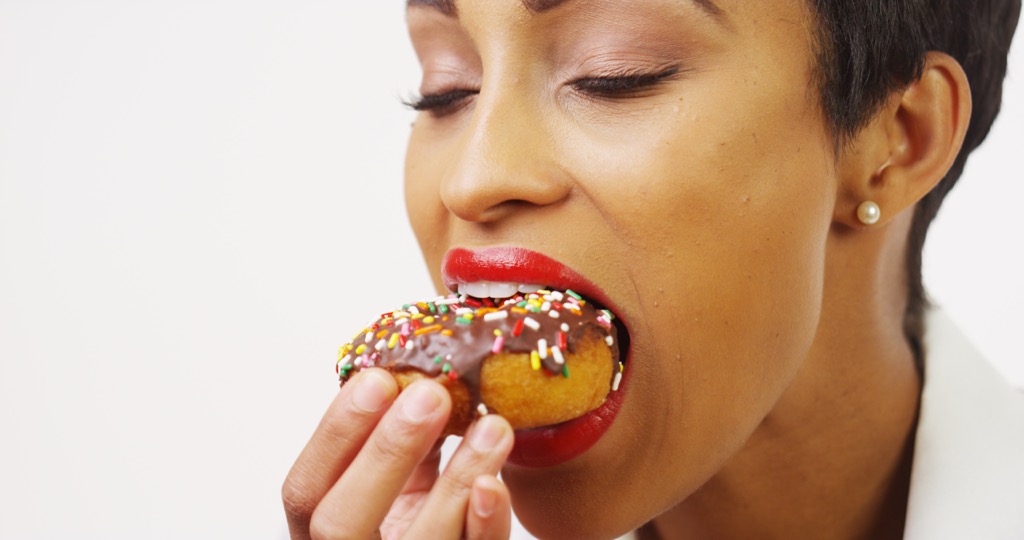
Listen, we get it. It’s fun to eat all that delicious grease and sugar. And when you’re young, it seems to slide right through you without more than the occasional stomachache. But it won’t be that easy for long. Just check out this 2012 study from Northwestern University, with the pretty unambiguous title “Lifestyle choices made in your 20s can impact your heart health in your 40s.” It comes down to this: The less junk you put in when you’re 20, the less likely you are to be a candidate for diabetes and heart disease when you’re 40.
3
Sticking with a mediocre job

We’re not all lucky enough to find our dream job right away. Sometimes it takes years of looking, and a lot of patience. But you will find it eventually, as long as you don’t let yourself settle. And it’s worth the journey. A study at Ohio State University found that landing a job in your 20s that makes you happy can have a big effect on midlife mental health.
“If I can give just one piece of health advice for 20-year-olds, I would suggest finding a job they feel passionate about,” Hui Zheng, a sociologist at Ohio State University, told the New York Times. “This passion can keep them motivated, help them find meaning in life, and increase expectations about their future.” When they reach 40, Zheng says, people who are less happy about their jobs “are more likely to report depression, stress, and sleep problems and have lower overall mental health scores.”
4
Not spending enough time alone

By the time you get married and have kids, you’ll be surrounded by people 24/7. You’ll barely be able to go to the bathroom without somebody knocking on the door with a question. Even at the office, if you’ve managed to move up the corporate ladder, you’ll have a team of employees requiring your constant attention. When you’re younger, don’t miss out on those opportunities to be truly alone. In all likelihood, you don’t have the type of social commitments yet that demand your total attention. A little solitude, where you’re responsible for nobody but yourself, is good for your brain.
5
Not being more spontaneous

You’ve heard that old proverb, “The grass is always greener on the other side?” Nowhere is that more true than with aging. The things you’re looking forward to with middle age—the handsome salary, the loving family, the big home with two cars in the garage—seem great from your vantage, but when you finally get there, you might find that you’d give it all away for the chance to be spontaneous again. When you’re young and barely employed, you have the freedom to get up and go with little or no notice. Get in a car and just drive with no destination, or call up some friends and make last-minute plans to go, well, anywhere you want. You’ll eventually get the stability you want, but for today don’t forget to enjoy being accountable to no one.
6
Acting like a jerk on social media

It’s not because it might cost you a job someday—and that’s a real risk, as a 2018 study from Career Builder found that 70 percent of employers check social media before hiring someone—but because you’re leaving a permanent record of your past that could leave you cringing for many years to come. The internet isn’t like passing paper notes in class, which usually end up crumbled and forgotten in a trash can, never to embarrass you again. No, some of these pictures and comments will be online forever, just waiting to be discovered by a spouse or your kids or, worst of all, you.
7
Not saving money

Even if you’re not ready for homeownership today, you will be in your 40s. And when that happens, it’ll be imperative to have a sizable amount in savings to use as a down payment. But investing in real estate is just one of your big financial needs during your 40s and beyond. You’ll need extra cash for weddings and your child’s (or children’s) education and even the beginnings of a retirement fund. Just a small percentage of your paycheck every week will add up over several decades into something substantial.
8
Worrying that the worst will happen

Here’s the obvious reason not to worry about things that might happen: 99 percent of the time, the worst-case scenario doesn’t come to pass. But there are more reasons to calm down than just the impracticality of it. Because high levels of cortisol are released when you worry, it can lower your immune system and affect heart health. Numerous studies have indicated that worrying too much in your 20s can lead to midlife consequences like heart disease, diabetes, depression, decreased fertility, and even balding.
9
Not spending time with your family

In your 20s especially, you get your first taste of independence, creating a life outside of family. But don’t make the mistake of cutting them out entirely. As much as your friends might seem like your everything right now, when you reach your 40s you’ll regret every moment you didn’t spend with relatives. Time goes by faster than you think, and as parents age and siblings set down their own roots, you’ll wish you had those years back—and had a second chance to know the people who should matter the most.
10
Not having a hobby

In your 40s, life gets more serious. Your job is more demanding, and your home life involves making sure your kids are doing their homework and there’s food on the table and the laundry gets folded and blah, blah, blah. You likely won’t have as much leisure time anymore to focus on something frivolous like a hobby. Do it now while time is still on your side, and you’re not shirking any responsibilities by spending a weekend building model airplanes or thumbing through crates of vinyl records at some dusty used record store. If your hobbies are already established, they’ll be easier to go back to in your 40s when you get some unexpected free time.
11
Gaining too much weight
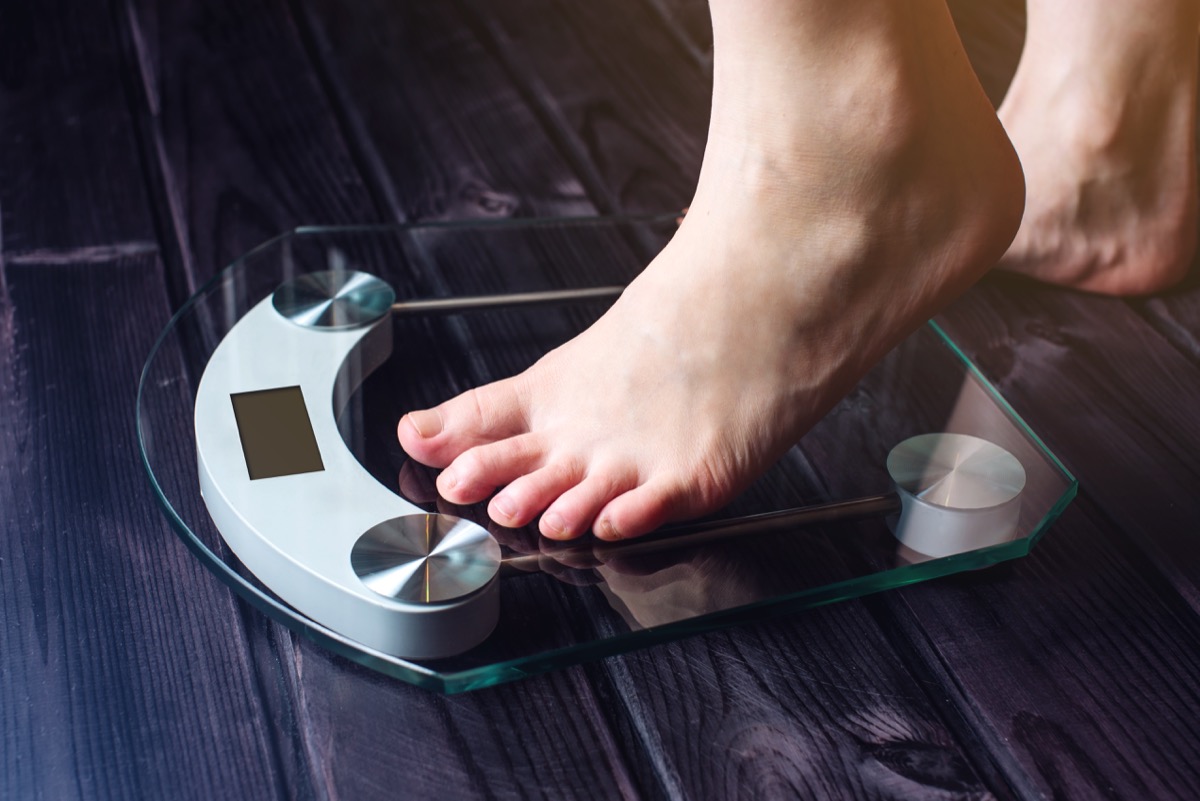
According to data from the Centers for Disease Control and Prevention, most people gain a disproportionate amount of weight in their 20s. The average woman in the United States adds twelve pounds during their 20s, while the average male games about nine. And these are during what’re assumed to be the leanest years, when your metabolism is firing on all cylinders. If you keep your weight under control in your 20s, it’ll be that much easier at 40 to control weight fluctuations. Let your body know, right from the start, “You’re not the boss of me!”
12
Letting friendships slip away

It’s easy to make friends when you’re young, and sometimes they can seem dispensable. If you lose your best friend or slip out of a close social circle today, the thinking goes, you can always replace them tomorrow. But as you age, it gets more difficult to hold on to friendships. The ones you’ve truly nurtured will stick around, and that will have a huge impact on you in your 40s. According to a 2017 study from Michigan State University, sponsored by the National Institute on Aging, holding on to friendships into middle age “can make a world of difference for our health and well-being,” says study author, psychologist William Chopik.
13
Not listening to your parents

We don’t know your parents, but we’re going to take a lucky guess that they’re not always wrong. In fact, they may be correct about more things than you’d like to admit. It’s too easy to get stuck in a rebellious stage, lashing out at our parent’s advice just because we resent being told what to do. But guess what? Everything you’re experiencing now, everything you’re about to experience in the future, your parents have been down that road first. Gaining from their wisdom isn’t a sign of defeat, it’s proof that you’re smart enough to take their counsel.
14
Beating yourself up for not being good enough

It’s all too easy to fall into a spiral of self-loathing, convincing ourselves that we’re not good enough and never will be. Here’s a secret for all you 20 year olds out there: You’re wrong. You are good enough, and you’ll figure that out eventually.
Yes, your self-esteem may feel beyond repair right now, but it does get better. A lot better, in fact, according to new research out of Switzerland. According to their findings, the age in which most people’s self-esteem peaks is 60. That’s right, long after we’re considered youthful and vibrant by popular culture, that’s when the majority of human beings decide, “I’m pretty spectacular.” So don’t waste that youth worrying that you should like yourself more. You’ll get there eventually.
15
Getting a tattoo
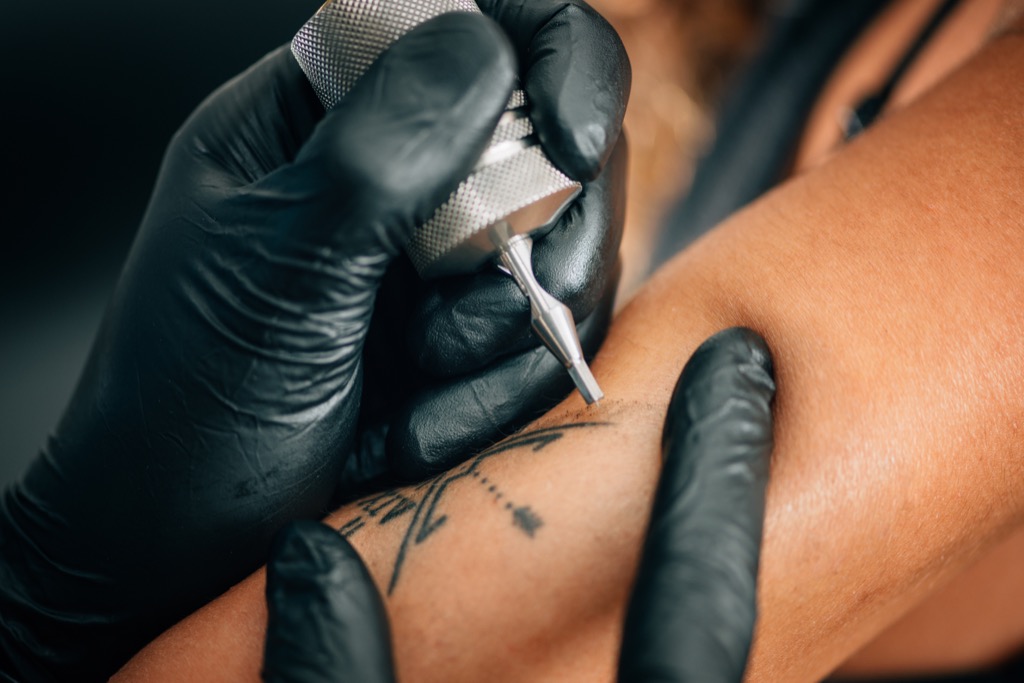
We know many of you will disagree with us. That’s fine. Hey, maybe you’re the 1 percent of people who got a tattoo at 20 and still think it’s awesome when you’re 40. If you managed to pull that off, congratulations. But for the other 99 percent, who still feel like idiots for getting that “Bon Jovi Rules” tattoo, or “I Will Always Love Jennifer,” reversing that decision would be the first thing they do if time travel ever became a reality. If you must get inked, though, start with the 100 Amazing Tattoos for First-Timers.
16
Holding on to grudges

It can take age and experience to develop a thicker skin, with the slightest offense doesn’t leave a chip on your shoulder that never heals. Get some practice in forgiving, even if in your heart you know you’re in the right and that jerk—he knows who he is—doesn’t deserve a second chance. We know it’s hard, but you have to learn how to be a bigger person. When you don’t develop the emotional muscles that help you forgive and forget, you’ll become more equipped to have healthy relationships that last well into, and well beyond, middle age.
17
Forgeting to balance partying with exercise

There’s nothing wrong with blowing off some steam over the weekend, even if that involves occasionally eating and drinking too much. Hey, we’ve all been there. But don’t forget to balance that behavior with healthy habits as well. As Barry Popkin, professor of global nutrition at the University of North Carolina at Chapel Hill, said in a recent interview, weekend exercise can “offset all those extra calories from Friday to Sunday that come with extra drinking and eating.”
Young adults consume about 115 more calories over the weekend then on any other day of the week, Popkin says. But you can keep your fun as long as you make up for it with calorie-burning activities the rest of the time. Establishing this type of accountability will serve you well in the long run, especially as you reach your 40s.
18
Tanning

You know the importance of sunscreen (we hope) but even safe tanning could be setting you on a course for disaster. Recent studies have shown that using an indoor tanning bed before the age of 35 can increase your chances of developing melanoma by over 50 percent. And having up to five serious sunburns before you reach the age of 20 can increase that melanoma risk by a whopping 8 percent, according to the American Academy of Dermatology. Do yourself a favor and keep the sun exposure to a minimum.
19
Not documenting your life

Write everything down. It could be a blog, if that’s your cup of tea. But it’s not about sharing your life experiences with the world. The things that seem so important today will fade from your memory, and when you’re 40 you will cherish every moment you wrote down, every detail you documented so that it wasn’t lost forever. Sure, you may remember the big moments, but never as vividly as just after it happened. It’s not just for you, your future children will love knowing what you were really like at their age.
20
Borrowing too much for college

You’re probably not thinking about the long-term consequences of student loans when you’re first applying for college. Well, those are decisions that will come back to bite you, again and again, even well into middle age. According to an online survey conducted by Harris Poll, 48 percent of college graduates feel like they could have borrowed substantially less money and still been able to afford their tuition. American graduates owe an estimated $1.4 trillion in student loan debt, and a Citizens Financial Group study discovered that 60 percent of them won’t be able to pay off those loans until at least sometime in their 40s.
21
Not seeing more live music

It’s not because you won’t see live music in your 40s. (At least we hope you don’t become one of those middle-aged people who never see a concert unless they’re guaranteed a chair.) But for the music you love when you’re 20, the experience of seeing it live is fleeting. The artists you care about, who create the music that stirs your soul, they won’t be performing forever. Bands break up. Musicians die or go into retirement. Don’t become one of those 40 year olds who talk about their favorite bands and then have to make excuses for why they never saw Nirvana or David Bowie or Frightened Rabbit in concert until it was too late.
22
Caring too much about what other people think

Did your mother ever ask you, “If all your friends jumped off a bridge, would you do it too?” Hopefully you replied with “Of course not,” but you still may be susceptible to peer pressure, especially in your 20s. Putting too much stock in the opinions of others, especially strangers, is how most people end up making their biggest life mistakes. (We wouldn’t want to be the 40-year-old explaining to his kids why he’s still struggling with ulcers because of the Tide Pod Challenge.) Researchers at the University of Virginia found in a 2013 study that teens succumbing to peer pressure had “difficulty establishing close friendships” well into adulthood, as well as difficulty with even minor disagreements with romantic partners.
23
Not traveling the world

You may have the free time and disposable income to travel freely in your 40s and beyond. But if you’re like most people, you’ll do the majority of your exploring in your early 20s, when your commitments are minimal and backpacking across Europe with nothing but a list of youth hostels doesn’t sound so terrifying. Nothing is quite so sad as a 40-year-old who never saw the world because she was too quick to get a job after college. You have the rest of your life to focus on your career, make some time to see the Eiffel Tower today.
24
Getting married too soon

Marriage is a very personal decision, and far be it from us to tell you when you should or shouldn’t make that leap of faith. But, just so you’re going in with all the facts, statistically divorce is 50 percent less likely if you get married at 25 rather than 20. And the divorce rate decreases incrementally as you move into your 30s and 40s. Which isn’t to say you’ll definitely be getting divorced if you say “I do” by 20. But there’s definitely a value to taking it slow, and working on making sure your relationship is solid before rushing to the altar.
25
Never learning to cook

You can only survive so long on pizza delivery and cold cereal. Teaching yourself how to cook is not just about becoming more self-sufficient and saving money on pre-made food. As Barbara J. Rolls, a professor of Nutritional Sciences at Penn State, told the New York Times, you’ll discover “tasty ways to add variety to your diet and to boost intake of veggies and fruits and other nutrient-rich ingredients.”
When you get to choose which ingredients are going into your meals, you’re better able to “cut down on the unhealthy fats, sugar and salt, as well as the excess calories found in many prepared convenience foods,” Rolls says. If you get into the habit today of making healthy meals in your own kitchen, that skill will only evolve and blossom, and by 40 you’ll have some serious culinary skills that not only keep your waistline trim but will astound your dinner guests.
26
Not getting enough sleep

The least effective way of terrifying a 20-year-old is telling them they should get more sleep “or else.” Sleep is widely considered a luxury at that age, something that’s refreshing when you get it but certainly not a priority to a healthy and productive life. You won’t find many of them worrying that getting just a few hours of sleep every night is going to slow them down. While they may not feel the effects today, rest assured that they will in another 20 years. According to a 2017 study out of the Netherlands, the long-term negative consequences of not getting enough sleep include “hypertension, dyslipidemia, cardiovascular disease, weight-related issues, metabolic syndrome, type 2 diabetes mellitus, and colorectal cancer.”
27
Regretting the past

There are two ways you can cope when you’ve made a mistake in your 20s. One, you can learn from it and move on, hopefully growing stronger by the knowledge you’ve acquired from your missteps. Or you can let it fester, filling you with regret that keeps you up at night, staring at your bedroom ceiling and cursing yourself for getting it so wrong. These kinds of regrets don’t go away, and they have a way of sticking around for the long haul. The last thing you need in your 40s, when you’ll have your hands full with real-world problems, is to still be carrying the baggage from your 20s. Forgive yourself for your mistakes and move on already.
28
Not volunteering enough

Getting into the habit of volunteering your time—whether for a charity or any other organization you want to donate your energy to, free of charge—is something you should definitely start early. Once you establish those patterns, and volunteering at least a few times a month becomes part of your regular routine, you’re more likely to continue it into middle age. And that’s where the real benefits happen. According to a 2013 study out of Carnegie Mellon University, people in mid-life who volunteer regularly are less likely to develop high blood pressure than those who only lift a finger if there’s something in it for them. And for more ways to give back, learn about the 17 Quirkiest Charities That Give Back in Creative Ways.
29
Living in the future

Wait, do you read that right? Isn’t the mistake to “live in the past”? Well sure, there’s that. But a bigger preoccupation for people in their 20s is looking ahead with blinders, anticipating a future they’ve always dreamed of while forgetting to appreciate what’s all around them. It’s fine to daydream about what your life will be like when you’re 40 (in fact, science says it means you’re wildly intelligent), but don’t let it distract you from everything that’s awesome about your life now.
30
Forgetting to take care of your teeth

Yes, remembering to brush your teeth after every meal is a huge hassle. But you know what’s a bigger hassle? Gum disease. Taking care of your teeth and visiting the dentist regularly couldn’t be more important, even if you assume your teeth are in pristine shape. According to the National Institute of Dental and Craniofacial Research, 26 percent of adults between the ages of 20 and 64 have some untreated decay. The only way to be sure is to make an appointment with your dental hygienist.
31
Never putting yourself in scary situations

We’re not talking about real danger. Don’t risk it all by taking stupid chances or putting yourself in real physical peril. We mean the kind of terror that’s all in your head. Performing in front of a crowd, for instance. Or skydiving out of a plane. Or trying exotic cuisine that creeps you out. (Don’t laugh, but some people are sincerely freaked out by sashimi.) These things can feel scary when you’re 20, but the more you avoid them and refuse to face your fear, the more they’ll grow to become monsters in your head. By the time you’re 40, after decades of blowing your fears out of proportion, it might be too late to take the plunge and find out what you’re capable of.
32
Spending too much on things you don’t need
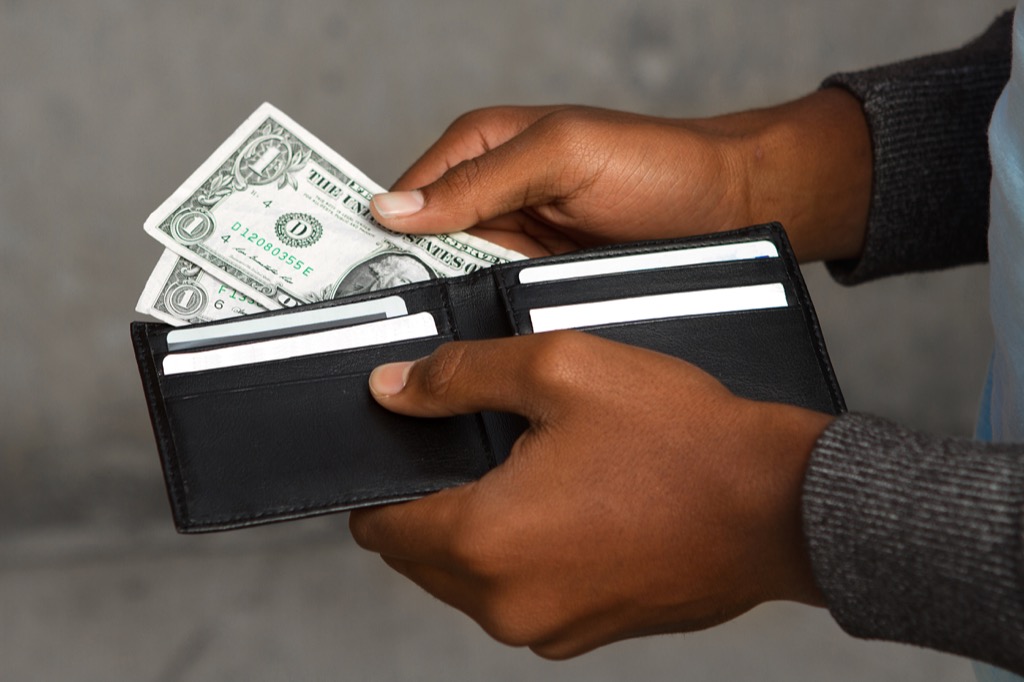
Nobody, in the history of human existence, has reached 40 years old and thought, “Gosh, I wish I’d bought more stuff.” You may get an endorphin rush every time you make a new purchase, but it’s not actually buying you any happiness. And in the long run, it may make you more miserable. A 2017 Pew study found that 46 percent of Americans spend more than they make every month. Those finance charges will start building up, and you know who’s going to have to pay them off? The middle-aged you, that’s who. And we can tell you right now, he’s not happy that the 20-year-old him thought he needed 18 different types of fitness trackers and an Echo dot in every room.
33
Not spending more time in nature

Getting outside and into nature isn’t just a great way to release your stress. It’s establishing behavior that will continue over a lifetime. In a 2016 survey of hiker demographics, 75 percent of them were under the age of 40. Which isn’t to say you won’t be hiking into your 40s and beyond, but you’re more likely to do it if it’s a habit you picked up when you were younger.
34
Not letting your inner child take control occasionally

When we’re just out of college, too many of us are in a rush to prove our maturity. We want the world to see us as dependable and serious adults, not kids pretending to be grown ups. And that’s great, as long as you don’t completely abandon the impulse to play. Your inner child is what keeps your sense of curiosity alive, your willingness to laugh too loud and have too much fun, even if it makes you look foolish. The more you push those natural instincts down, the more difficult it will be in your 40s to just let yourself go and be silly for no reason. Your inner child isn’t going to squash your reputation and ruin your chances of a long career; he’s going to give you a reason to smile again.
35
Ignoring your credit score

When you’re living with roommates and don’t have any material possessions besides a futon and bicycle, your credit score sure doesn’t seem like anything that should concern you. But that’s where you’re wrong. Some research has indicated that teenagers have better credit than people in their late 20s. And once your credit has started to crash, the work and time it takes to rebuild it can be exhausting. Don’t give yourself an unnecessary uphill battle. Be careful to pay your bills on time and work on building your credit history, and you’ll make life much easier for the 40-year-old you.
36
Using pills to boost focus

The pressure surrounding academic success for teens and college student can be so intense that many of them seek out drugs like Adderall, usually prescribed for patients with ADHD, to sharpen and enhance mental performance. But new studies indicate that a dependence on such drugs can have deadly consequences, especially if it continues well into adulthood. In addition to a physical and psychological dependence, it can alter the dopamine activity in our brain’s reward center, “alter(ing) our ability to experience pleasure without the chemical support of continued amphetamine use.” Just what every 40-year-old wants to hear—you can’t experience joy anymore without a pill. Thanks, 17-year-old me who thought he needed Adderall to ace that science test!
37
Watching more TV than reading

There are oodles of research studies demonstrating the positive effects that comes with a lifetime of reading, from helping your brain prepare for uncertain situations in life to slowing down or preventing Alzheimer’s and dementia. As for all that TV, well, it’s been linked with a decline in cognitive function in middle age. As tempting as it can be to waste another weekend with a long binge-fest of your favorite new TV series, do your brain a favor and pick up a book instead.
38
Not learning a second language

Being bilingual isn’t just about having a cool party trick or being able to travel without a translation phrasebook. Learning a new language today could increase your salary in your 40s. That’s according to an MIT economist, who studied the connection between learning a foreign language and future earnings. That talent is a big boon in an increasingly global economy, and research suggests it could up your earning potential by as much as 3 percent.
39
Staying in a bad relationship

Whether you’re afraid of being alone or you think that you’ll be able to change them, there are many reasons people stay in a toxic relationship. And every single one of those reasons is wrong. You’ll realize it eventually, and while it’s never too late to find love again—you’re still a spring chicken in your 40s—the damage to your health might’ve already been done. Studies have found that staying in a bad relationship can put you at risk for heart disease, high blood pressure, and obesity.
40
Not slowing down enough to appreciate the small things
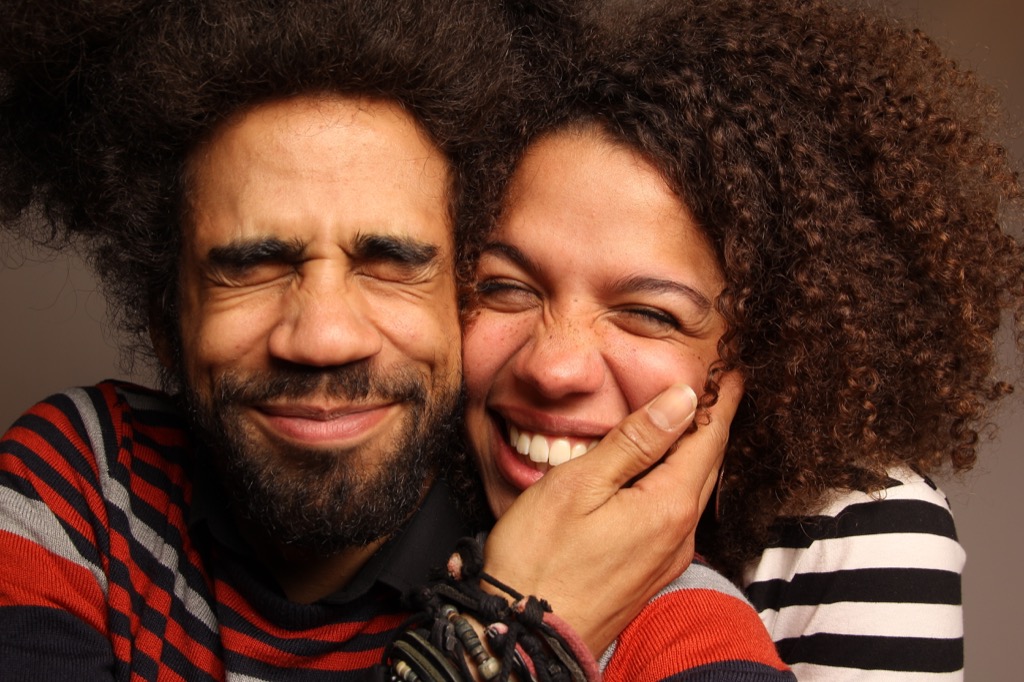
You may recoil at advice like “Stop and smell the roses” as being too cliché, but it’s backed up by science. A 2012 survey of college students by Rutgers University found that their levels of daily appreciation—which they defined as “acknowledging the value and meaning of something—an event, a behavior, an object—and feeling positive emotional connection to it”—had a direct impact on their overall happiness. Take a moment every once in awhile to look around and appreciate what you have. It’s a habit that’ll stick with you, and just enrich your life when you reach middle age.
To discover more amazing secrets about living your best life, click here to follow us on Instagram!